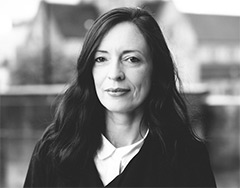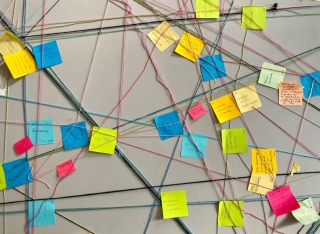UNIDEE Modules Summer 2022: Sustaining Embedded Arts Practice | open call & selected residents
Concluding the research arc around embedded arts practices curated by Andy Abbott (note 1), UNIDEE and Cittadellarte-Fondazione Pistoletto are pleased to invite applications for the next UNIDEE Residency taking place June 2022 at Cittadellarte, Biella, Italy.
The residency is an opportunity to share and unpack your ongoing practice or action research with a group of peers and guest mentors including artist and co-leader of the Victoria Square Project Maria Papadimitriou (Greece), economic geographer and co-author of Take Back the Economy: An Ethical Guide for Transforming Our Communities, Professor Katherine Gibson (Australia), artist, activist, and author of Art as Social Action and Dark Matter, Gregory Sholette (USA), cultural producer and director of the creative regeneration practice Media and Arts Partnership (MAAP), Sue Ball (UK), and curator, writer, researcher and artistic director of the East Leeds Project Dr Kerry Harker (UK).
Over the course of two weeks two groups of up to eight residents will engage in a programme of seminars and presentations, group discussions and critiques, workshops, visits, and other responsive and informal activities through which you will gain multiple perspectives on the work you are undertaking in your locale. There will be a focus on practical methods for sustaining long-term and durational embedded arts practices.
For more context and information about the background and concept for the residency see ‘Curatorial Statement’.
Note:
1 - See 2020’s Embedded Arts Practice in a Postpandemic Future, 2021’s Groundwork for Embedded Arts Practice residencies and Tools and Technologies for Embedded Practice Arts Labs, and 2022’s Tools for the Commons Arts Labs.
The programme will be split into two sequential week-long residencies for up to 8 residents each, with a seminar and handover session to link the two. The residency will take place at Cittadellarte Fondazione-Pistoletto using the UNIDEE Residency Program space as a shared studio for group discussions, sharing sessions and presentations, with the opportunity for exploration and engagement with the postindustrial and rural landscapes of Biella. Participants will visit the exhibitions in Cittadellarte as an entry point to its practice.
The methods we will draw upon include group critiques - at which you will be expected to give a short presentation of the practice or action research you are sharing as part of the residency - as well as group exercises, workshops and less formal activities (group meals, walks etc.). At the end of the week you will be asked to leave a trace of your experience as a basis for a handover and a ‘toolkit for embedded practice’.
Residents will stay in accommodation within Cittadellarte that includes basic cooking facilities.
Participants of week one will arrive on evening of Sunday 5th June and depart Monday 13th June.
Maria Papadimitriou will be the guest mentor for this week.
Participants of week two will arrive Friday 10th June and depart Saturday 18th June.
Gregory Sholette, Katherine Gibson, Sue Ball and Kerry Harker will be the guest mentors for this week.
There will be a symposium and seminar on Saturday 11th June with all guest mentors and a handover session on Sunday 12th June for both groups.
There is a €280 fee to cover participation in the residency and accommodation whilst in Biella. Participants will be required to arrange and cover their own travel to/from Biella and food/living costs whilst in Cittadellarte.
A limited number of part and full bursaries (including a contribution towards travel costs) are available to those that would not otherwise be able to participate; please state in your application if you would need to be considered for these in order to take part.
We hope to select a cohort of 8 participants per week from an open call that will include previous UNIDEE alumni. For alumni of previous programmes the ongoing embedded practice you will share can be that which you developed during your previous UNIDEE 2020-22 residencies, an extension of this or a related project. Selection will be based upon participants’ willingness and ability to share the practice they are engaged in, and collectively reflect upon this with peers. We will aim to select cohorts with a range of practices, location/perspective and experience.
Application is by Expression of Interest by filling out the application form with the following requirement:
• Indicate the week of preference
• Up to 150 words about yourself and your practice and/or experience, and your suitability for the programme.
• Up to 200 words about the ongoing project or research that you will share and develop as part of the residency including details about the local context (place, communities, audiences) and what long-term change you could hope to facilitate. For alumni of the previous UNIDEE embedded arts residencies the ongoing embedded practice you will share can be that which you developed during your previous residency, an extension of this, or a related project.
• Up to 150 words about how you may share this practice with others and what you hope to gain and learn from the residency.
• If you would like to apply for a bursary to go towards travel expenses and/or cover the residency fee up to 150 words explaining why you would like to be considered for a bursary and an outline of costs.
• and a CV / Portfolio in PDF format (max 8mb).
* Please state if you would like to be considered for a bursary to subsidise the residency fee.
Applicants must submit their application by email to: unidee@cittadellarte.it stating: “UNIDEE 2022 Summer Residency application (your name)” as a subject line.
Deadline for submissions is 7th April 2022 and we will let successful applicants know a decision by 15th April 2022.
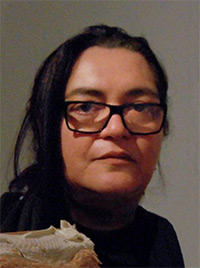
Maria Papadimitriou is a Greek contemporary visual artist. After graduating with an honors degree in painting from the École Nationale Supérieure des Beaux-Arts (ENSBA), Paris, Papadimitriou began practicing as a visual artist in 1989. She realizes her artworks through sculpture, installation, public art, video, and photography.
As an artist she is renowned for her ability to investigate collaborative projects and collective activities that highlight the interconnection between art and social reality. She teaches at the Department of Architecture, University of Thessaly, and is the founder of T.A.M.A. (Temporary Autonomous Museum for All, est. 1998) and SOUZY TROS Art Canteen. Since 2017 she is the co-leader artist at Victoria Square Project in collaboration with the American artist Rick Lowe.
www.onassis.org/video/alter-ego-maria-papadimitriou
www.victoriasquareproject.gr
souzytros.wordpress.com/about
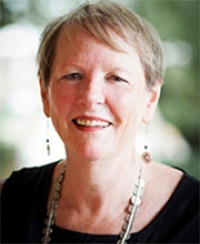
Katherine Gibson is an economic geographer with an international reputation for innovative research on economic transformation and over 30 years’ experience of working with communities to build resilient economies. As J.K. Gibson-Graham, the collective authorial presence she shares with the late Julie Graham (Professor of Geography, University of Massachusetts Amherst), her books include The End of Capitalism (As We Knew It): A Feminist Critique of Political Economy (Blackwell 1996), A Postcapitalist Politics (University of Minnesota Press, 2006) and Take Back the Economy: An Ethical Guide for Transforming Our Communities, co-authored with Jenny Cameron and Stephen Healy (University of Minnesota Press, 2013) and The Handbook of Diverse Economies co-edited with Kelly Dombroski (Edward Elgar, 2020).
www.westernsydney.edu.au/ics/people/researchers/katherine_gibson
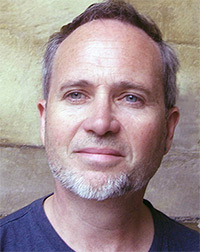
Gregory Sholette is an artist, activist, writer, curator of the mobile project Imaginary Archive: (a collection of documents about the past whose future never arrived). He is Professor at Queens College, City University of New York, where he co-directs the Social Practice art program with Chloë Bass, and he is a founding member of the collectives, Political Art Documentation/Distribution (1980–88), REPOhistory (1989–2000), and Gulf Labor Coalition (2010–). Sholette attended the Whitney Independent Studies Program, New York (1996); University of Amsterdam (PhD: 2017); University of California, San Diego (MFA: 1995); and Cooper Union, New York (BFA: 1979). He is author of The Art of Activism and the Activism of Art, (Lund Humprhies, forthcoming 2022); Art as Social Action with Chloë Bass (Allworth Press, 2018); Delirium and Resistance: Activist Art and the Crisis of Capitalism (Pluto Press, 2017); Dark Matter (Pluto Press, 2010); Collectivism After Modernism with Blake Stimson (2007); The Interventionists with Nato Thompson (MIT 2004).
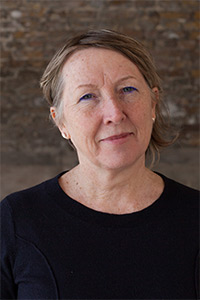
Sue Ball is a cultural producer who works in the context of social and spatial design, and is Director of the creative regeneration practice Media and Arts Partnership (MAAP) run from Leeds (UK). She operates in the gaps between sectors and disciplines to generate new professional learning and interdisciplinary design processes for urban space, and works to mobilise and strengthen value systems related to place and community.
Commissioned by Canal and River Trust since 2010, Sue has developed a ‘slow architecture’ methodology to re-occupy historic waterside sites across the UK. She has worked extensively with the Higher Education sector and led a number of funded interdisciplinary research programmes, including in the Making of Place with Prof Franco Bianchini (2008-10); and Ways of Hearing (2011-14). Sue is Exec Chair/Director for Yorkshire Visual Arts Network since 2018 since when she has led a root and branch overhaul of the organization using a co-production model to ensure greater alignment with the artist-led and visual arts practitioner in order to produce research and evidence for use in policy and practice. She has worked with notable international artists in the fields of public practice and sound and co-produced city festivals including Situation Leeds 2005 and Expo Leeds 2009 with national agency Sound and Music. Sue was Artistic Director of Pavilion Media Arts from 1996-2000.
Dr Kerry Harker is a curator, writer and researcher based in Leeds (UK). She is the Founder and Artistic Director of the East Leeds Project (2017- ). She has co-founded a number of other visual arts initiatives including Project Space Leeds (2006- ) and The Tetley centre for contemporary art (2013- ) and worked within institutional settings including Harewood House Trust (2008-11); The Art House in Wakefield (2015-16); and currently as curatorial researcher at The Hepworth Wakefield (2021- ). Harker completed her PhD in the School of Fine Art, History of Art & Cultural Studies at the University of Leeds in 2021, where her research focused on questions of space, value/s and processes of institutionalisation in relation to artist-led initiatives in the UK since the 1990s.
